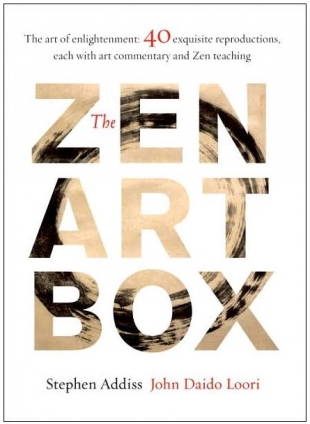The Zen Art Box contains 40 examples of Zen art by great masters, each reproduced on a 6 1/2 inch by 9 inch card. On the back is an explanation of the art by Stephen Addiss, Tucker-Boatwright Professor in the Humanities - Art at the University of Richmond, Virginia , and a Zen commentary by John Daido Loori, the spiritual leader and abbot of the Zen Mountain Monastery in Mount Tremper, New York. Also included is a folding easel stand which can be used to display the art.
A 32-page color-illustrated booklet "On Zen Art" contains essays by the two authors. Addiss explores "Zen Painting and Calligraphy: History and Characteristics" and Loori explains "Art as Teacher." Loori points out that art has always been transformative:
"It enlarges the universe, touches the heart, and illuminates the spirit. The Zen arts, because their emphasis on spiritual insight derived from personal experience, are a powerful tool of self-exploration. They point to a whole new way of seeing ourselves and the universe, and a way of living that is simple, spontaneous, and vital. As the Zen pioneer D. T. Suzuki said, 'The arts of Zen are not intended for utilitarian purposes or for purely aesthetic enjoyment, but are meant to train the mind, indeed, to bring it in contact with ultimate reality.'
"Most important, what is being offered in the powerful and profound teachings of the Zen arts is simply a process of discovery and transformation. If we can appreciate that process and are willing to engage it, we will find before us a way to return to our inherent perfection, the intrinsic wisdom of our lives. And that is no small thing."
